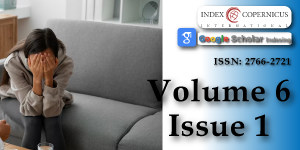Being a parent of a child with cancer: What psychosocial and family repercussions
Main Article Content
Abstract
Cancer is a serious disease that affects deeply and painfully not only the child who has cancer but also their parents. Through this study, we describe the different aspects of the impact of pediatric cancer on parents: the psychological, social, and family impact to offer optimal care to these parents.
Results: mothers represent 82.5% of the participants in our survey. More than sixty percent were of urban origin. The average time from diagnosis to parents’ assessment was 7.3 months. This announcement was made by doctors in 87.5% of cases. Conscious denial of cancer when it was announced was reported in 75% of parents. The social impact of pediatric cancer on parents was significant. The child’s illness was experienced as a very significant psychological distress; all of the parents said they had given up on important projects after their children’s illness. The psycho-emotional impact was represented by feelings of guilt in 37.5% and incapacity for illness in 30%. Forty-two percent felt tensions on the marital level with significant repercussions on the couple with a type of destabilization in 60% of cases. The parent’s relationship with the rest of the family, especially siblings, was marked by neglect and anxiety in 35% and 26% respectively.
Conclusion: The discovery of pediatric cancer induces various feelings that will inevitably have an impact on the parents of the affected child. Understanding the different aspects of this impact on the parents’ psycho-social, emotional and family experiences will make it possible to offer optimal care.
Article Details
Copyright (c) 2022 Zouine M, et al.

This work is licensed under a Creative Commons Attribution 4.0 International License.
Canada has public health. Leading causes of death, canada, 2008, males and females combined, number (death rate by age group per 100,000). AEM. 2008.
Ward ZJ, Yeh JM, Bhakta N, Frazier AL, Atun R. Estimating the total incidence of global childhood cancer: a simulation-based analysis. Lancet Oncol. 2019 Apr;20(4):483-493. doi: 10.1016/S1470-2045(18)30909-4. Epub 2019 Feb 26. PMID: 30824204.
Claire van Pevenage and Isabelle Lambotte. The family facing the seriously ill child: the psychologist's point of view. Families with seriously ill children: the psychologist's perspective.
Saltel P. announcement of a disability, hear from parents seeking care. Interuniversity diploma in pediatric pain and palliative care, pdf of the slide show, 2010-2012 session. lyon 1 / clermont-ferrand 1 / nancy 1 / paris v / paris vi.
Bétrémieux P, Gold F, Parat S, Farnoux C, Rajguru M, Boithiais C, Mahieu caputo D, Jouannic JM, Hubert P. The practical implementation of palliative care in the different places of care: 3rd part of reflections and proposals around palliative care in the neonatal period. Pediatric Archives. 2010; 420-425.
Patenaude AF, Kupst MJ. Psychosocial functioning in pediatric cancer. J Pediatr Psychol. 2005 Jan-Feb;30(1):9-27. doi: 10.1093/jpepsy/jsi012. PMID: 15610981.
Dolgin MJ, Phipps S, Fairclough DL, Sahler OJ, Askins M, Noll RB, Butler RW, Varni JW, Katz ER. Trajectories of adjustment in mothers of children with newly diagnosed cancer: a natural history investigation. J Pediatr Psychol. 2007 Aug;32(7):771-82. doi: 10.1093/jpepsy/jsm013. Epub 2007 Apr 2. PMID: 17403910.
Thorne S. The family cancer experience. Cancer Nursing. 1985; 8(5): 285-291.
Carter EA, Mcgoldrick M. the family life cycle: a framework for family therapy. Gardner press, new York
Aregui C. My child has cancer: understanding and being helped 2014. National cancer institute.
Nijboer C, Tempelaar R, Sanderman R, Triemstra M, Spruijt RJ, van den Bos GA. Cancer and caregiving: the impact on the caregiver's health. Psychooncology. 1998 Jan-Feb;7(1):3-13. doi: 10.1002/(SICI)1099-1611(199801/02)7:1<3::AID-PON320>3.0.CO;2-5. PMID: 9516646.
Wellisch DK, Jamison KR, Pasnau RO. Psychosocial aspects of mastectomy: II. the man's perspective. Am J Psychiatry. 1978 May;135(5):543-6. doi: 10.1176/ajp.135.5.543. PMID: 645946.
Saltel P. psychological adaptation of loved ones to the disease, and how to approach end-of-life situations? In: psychological adaptation of relatives to the disease workshop, “cancer and relatives” forum, Paris, 10 December.

